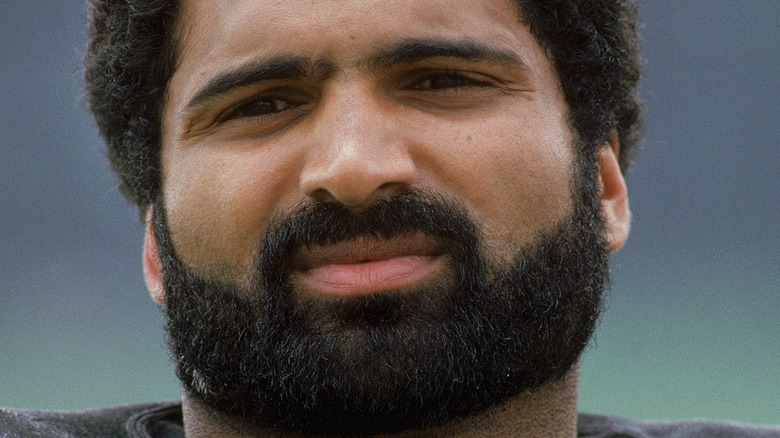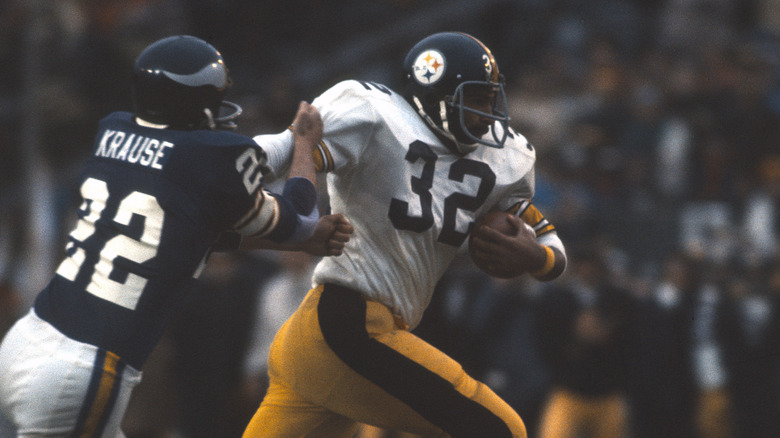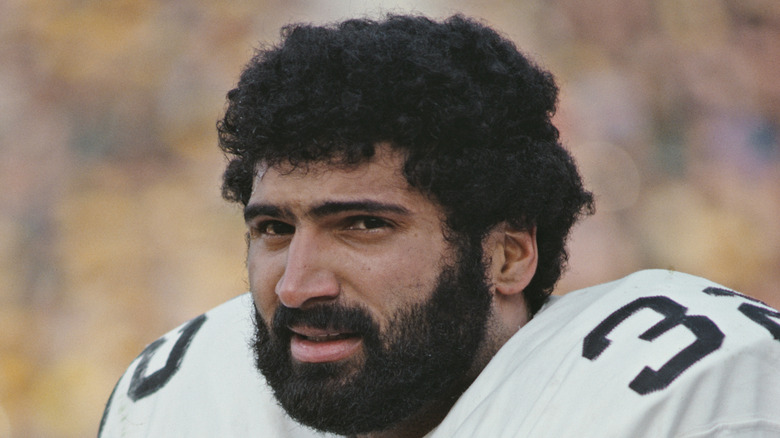Why Franco Harris Feuded With The Pittsburgh Steelers For Two Decades
Football star Franco Harris became a legend when he caught what is now known as the "Immaculate Reception" (via The New York Times). According to CNN, Harris was a student at Penn State when he was drafted by the Pittsburgh Steelers in 1972. In December of that year, he made history during a game between the Steelers and the Raiders. The Steelers were trailing 7-6 when quarterback Terry Bradshaw threw the ball to Frenchy Fuqua. At that moment, Raiders player Jack Tatum collided with Fuqua and the ball went flying. However, the ball flew towards Harris who picked it up and scored a touchdown.
The Guardian reports that this move provided the Steelers with their first-ever playoff victory. 50 years after the "Immaculate Reception," Mike Tomlin, the Steelers' current head coach (via the NFL), explained the gravity of that moment. He stated (per the Steelers Depot), "What it did for them that season in terms of the trajectory of the season. What it's done for this franchise. There's many things that make it the play that it is. The most significant play in the history of the game."
The New York Times reports that Harris and the Steelers went on to win the Superbowl in 1974, 1975, 1978, and 1979. Boston writes that he ultimately spent 12 seasons with the team before things unfortunately soured.
Harris and the Steelers were unable to negotiate a contract
In August 1984, The New York Times reported that Harris was placed on a waiver by the Steelers. In the NFL, this means that a player is not technically released from their contract but can nonetheless still be claimed by another team (via Diario AS). This news came as Harris was on the verge of breaking NFL player Jim Brown's rushing record. Plaintiff Magazine explains that Harris, then 34, was not in the best physical condition to continue playing football. Nevertheless, the Steelers offered to sign him for another season with the same contract he had received the year before, in order for him to break Brown's record with the team.
Boston states that Harris' contract paid him $385,000 a year. However, he wanted a significant raise. Per Plaintiff Magazine, the Steelers opposed this request as they believed he was not worth what he was asking for, and they decided to let Harris go. The Guardian writes that when Harris was a no-show at training camp, then coach Chuck Noll was asked about his whereabouts. He replied, "Franco Who?"
Steelers president Dan Rooney later announced (via The New York Times), "It's over." He added, ”We did everything we could to sign Franco. We initiated the negotiations in March and negotiated in good faith throughout the talks. We wanted to do this right and we wanted him to get the record.” Harris, on the other hand, stated, ”I don't think they really wanted me. That's what I think it came down to.”
Franco Harris went on to play for the Seattle Seahawks
According to Boston, Harris ended up getting the pay raise he wanted with the Seattle Seahawks. However, The Spokesman-Review writes that this union was short-lived. Harris only played in eight games before retiring in 1984 (per The New York Times). He later admitted that he was too attached to the Steelers to commit himself to the Seahawks. Harris stated (via Boston), "I wasn't ready to play for another team." He continued, "I really couldn't envision myself in another uniform." That said, The Guardian reports that Harris, a New Jersey native, settled in Pittsburgh where he opened a bakery and became involved in local charities.
A 2006 article from Boston states that Harris later made peace with the Steelers for releasing him. He explained, "I don't even think about that now." Harris added, "I'm still black and gold." It seems that the Steelers also have no hard feelings. In September 2022, the Steelers announced that they were going to retire Harris' no. 32 jersey to mark the 50th anniversary of the "Immaculate Reception" (via the NFL). Symbolically, this was scheduled for a Steelers game against the Raiders on Christmas Eve. On hearing this news, Harris expressed shock and gratitude Per Audacy.
Tragically, Harris was never able to see his number retired. He died only four days before the Christmas Eve game (per The New York Times). Shortly after, Art Rooney II, the Steelers president, released a statement that read, "It is difficult to find the appropriate words to describe Franco Harris' impact on the Pittsburgh Steelers, his teammates, the City of Pittsburgh and Steelers Nation."


